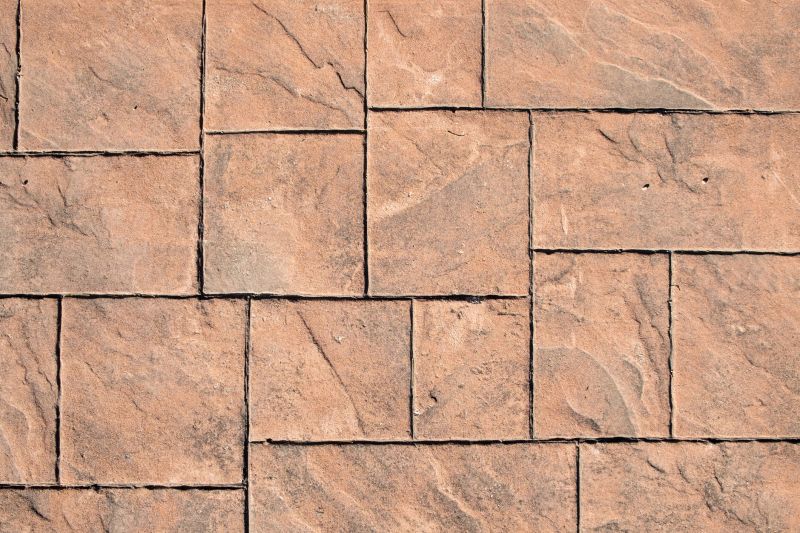Top-Rated Products For Stamped Concrete Service Applications
Identify key products that improve surface texture, color consistency, and overall durability in stamped concrete projects.
 Stamped concrete services in Modesto, CA, offer a versatile and visually appealing option for enhancing various outdoor and indoor surfaces. This decorative technique involves impressing patterns and textures onto freshly poured concrete, creating the appearance of materials such as brick, stone, slate, or tile. The process typically begins with the application of a base color, followed by stamping with textured mats that impart the desired pattern. Once the stamping is complete, sealers are applied to protect the surface and enhance its aesthetic appeal, ensuring durability and longevity.
Stamped concrete services in Modesto, CA, offer a versatile and visually appealing option for enhancing various outdoor and indoor surfaces. This decorative technique involves impressing patterns and textures onto freshly poured concrete, creating the appearance of materials such as brick, stone, slate, or tile. The process typically begins with the application of a base color, followed by stamping with textured mats that impart the desired pattern. Once the stamping is complete, sealers are applied to protect the surface and enhance its aesthetic appeal, ensuring durability and longevity.
Top Overall Option
Comprehensive Stamped Concrete Kit
A complete stamped concrete kit typically includes a selection of stamping mats, release agents, color hardeners, integral colors, and sealers. These kits are designed to provide all essential components in one package, making it easier for contractors and DIY enthusiasts to achieve professional results. They often feature a variety of patterns and textures, allowing for customization to suit different project styles. The quality of materials in these kits can influence the ease of application, final appearance, and durability of the finished surface.
Types of Products For Stamped Concrete Service
Stamping Mats
Textured mats used to imprint patterns onto fresh concrete, available in various designs resembling stone, brick, or slate.
Release Agents
Powders or liquids applied to prevent stamping tools from sticking and to create a contrasting color effect.
Color Hardeners
Powdered pigments applied to the surface to add vibrancy and depth to the concrete color palette.
Integral Colors
Colorants mixed into the concrete mix before pouring to achieve uniform coloration throughout the surface.
Sealants
Protective coatings applied after stamping to enhance durability, gloss, and resistance to stains.
Texturing Tools
Tools used to add additional surface details or to refine stamped patterns for a more natural look.
Color Washes
Overlay or accent colors applied to enhance patterns and add aged or antiqued effects.
Acid Stains
Chemical stains that produce variegated and translucent color effects for a unique finish.
Overlay Materials
Thin layers of decorative overlay products used to repair or enhance existing stamped concrete surfaces.
Jointing Tools
Tools used to cut control joints, helping to prevent cracking and improve surface longevity.
Popular Choices
Widely used for creating textured surfaces that resemble natural stone or brick patterns.
Sealers that provide a durable, glossy finish while protecting against stains and wear.
Colors that add richness and depth to stamped concrete surfaces, often favored for their versatility.
Consistent coloring throughout the concrete for a uniform appearance, popular in many projects.
Products that facilitate clean stamping and enhance pattern contrast, trending among contractors.
Sealants that provide a shiny finish, highlighting stamped patterns and colors.
Chemical stains that produce variegated, natural-looking color effects, popular for custom designs.
Overlay materials used to repair or enhance existing stamped surfaces, gaining popularity for renovation projects.
Essential for managing cracking and maintaining aesthetic integrity, frequently used in stamped concrete installations.
The range of products used in stamped concrete projects includes specialized release agents, color hardeners, integral colors, sealers, and stamping mats. Each component plays a vital role in achieving a professional-looking finish. For example, release agents prevent the stamping tools from sticking to the concrete, while color hardeners add vibrancy and depth to the surface. Sealers not only provide a protective layer but also enhance the visual qualities of the stamped pattern. Choosing the right combination of these products depends on the specific project requirements, desired appearance, and environmental conditions.
In Modesto, CA, homeowners and contractors often seek high-quality materials to ensure the durability of stamped concrete surfaces amid the local climate. Proper product selection can help prevent issues such as surface wear, color fading, or cracking. It is important to consider the compatibility of products, application methods, and drying times. By selecting appropriate products and techniques, professionals can create stunning, long-lasting stamped concrete features that enhance curb appeal and property value.
Whether for patios, walkways, driveways, or interior floors, the right products for stamped concrete service are essential for achieving consistent and attractive results. Investing in reliable, well-reviewed materials can make a significant difference in the outcome of a project, ensuring that surfaces maintain their beauty and functionality over time. Consulting with local suppliers and experienced contractors can provide additional guidance tailored to the specific needs of projects in the Modesto area.
Key Buying Considerations
- Compatibility of products with existing concrete surfaces and project requirements.
- Durability and resistance to wear, especially in high-traffic areas.
- Ease of application and drying times to fit project schedules.
- Color options and the ability to achieve desired aesthetic effects.
- Quality and reputation of the product brand or manufacturer.
- Environmental conditions such as temperature and humidity during application.
- Sealing requirements for protection and maintenance of stamped surfaces.
- Size and variety of patterns available in stamping mats.
- Cost-effectiveness and overall value for the scope of the project.
- Availability of technical support or guidance from suppliers.
- Compatibility of sealers with the underlying materials and colors.
- Flexibility of products to accommodate surface repairs or modifications.
- Safety considerations during application, including ventilation and protective gear.
- Long-term performance and customer reviews or feedback.
